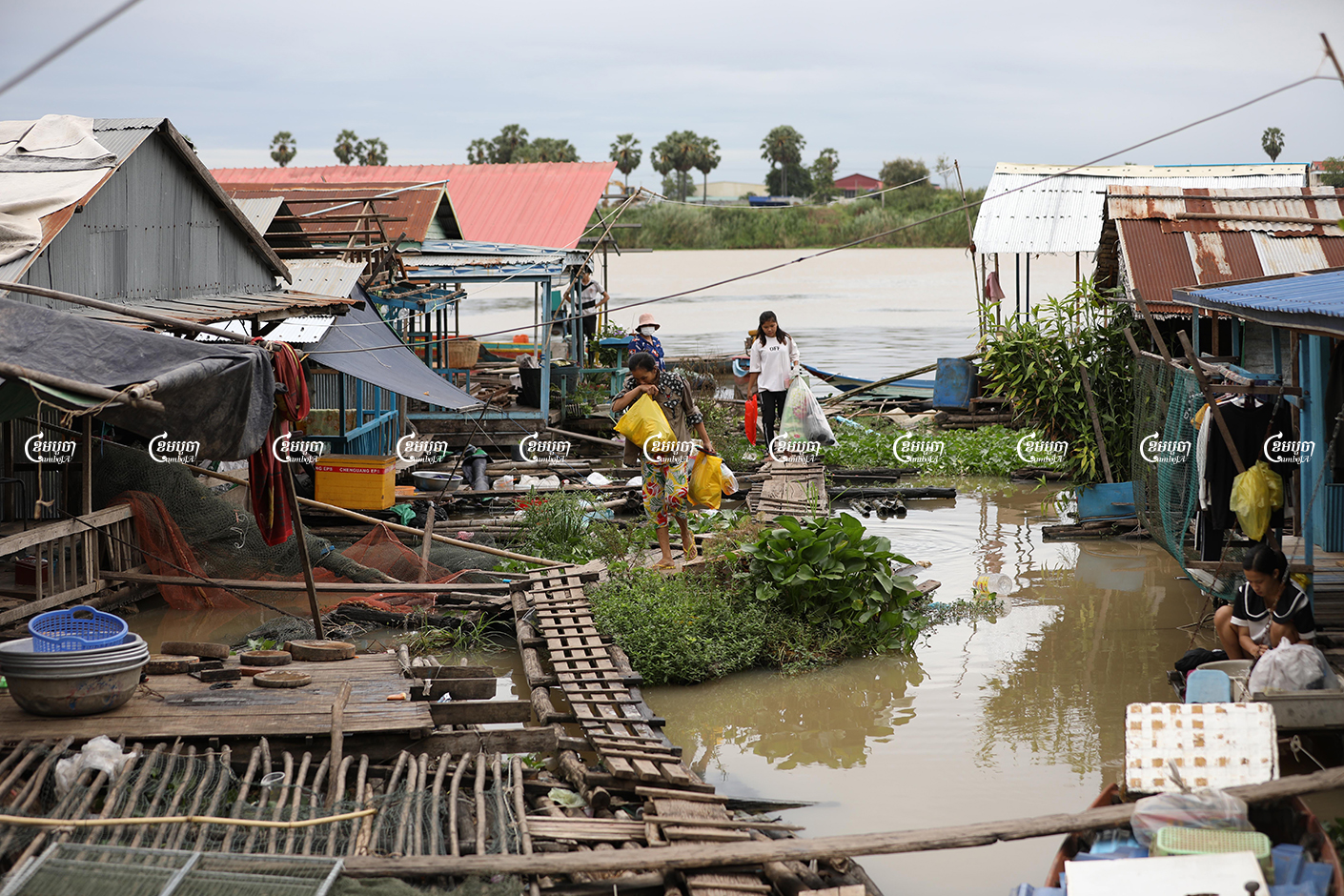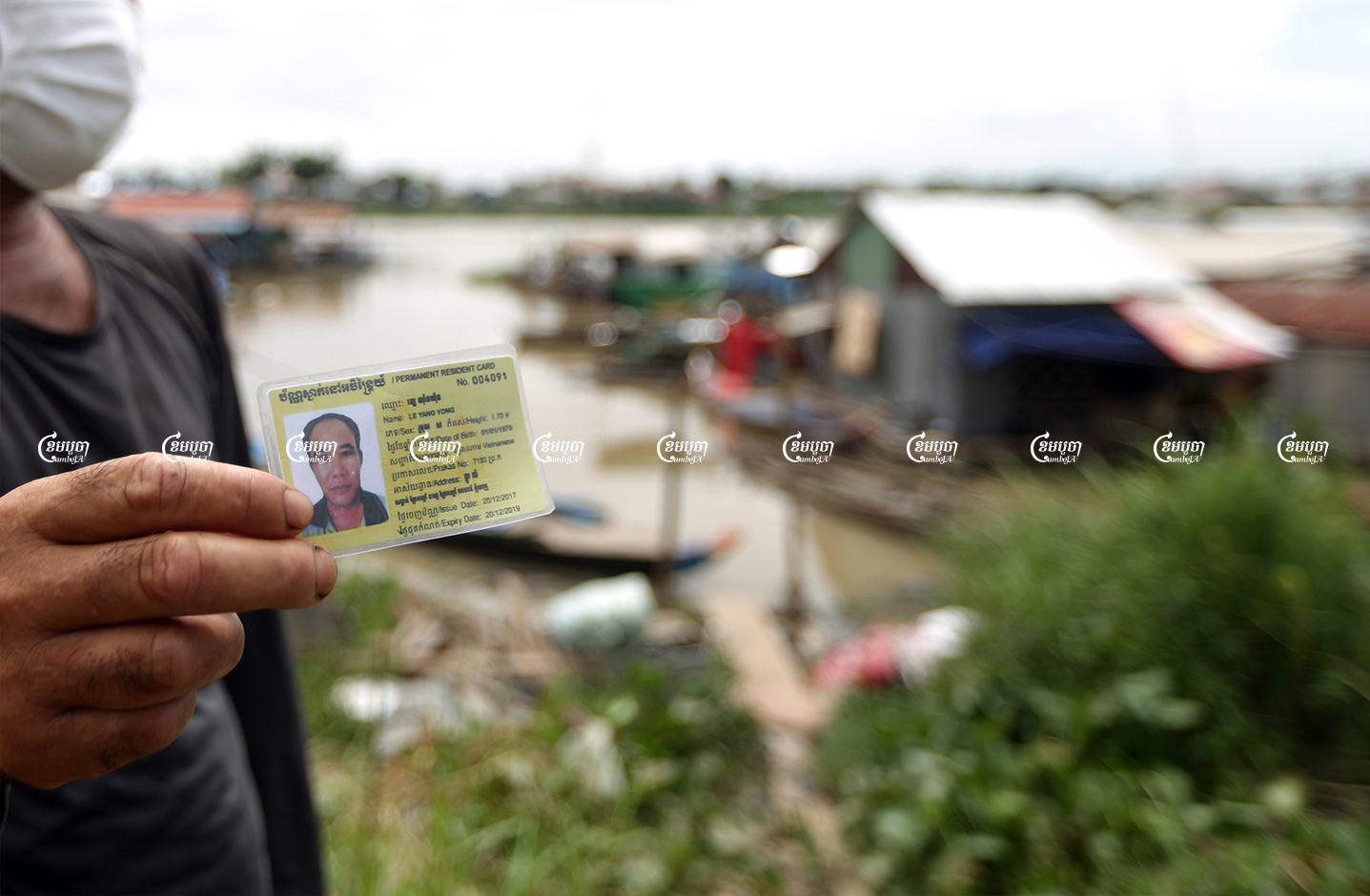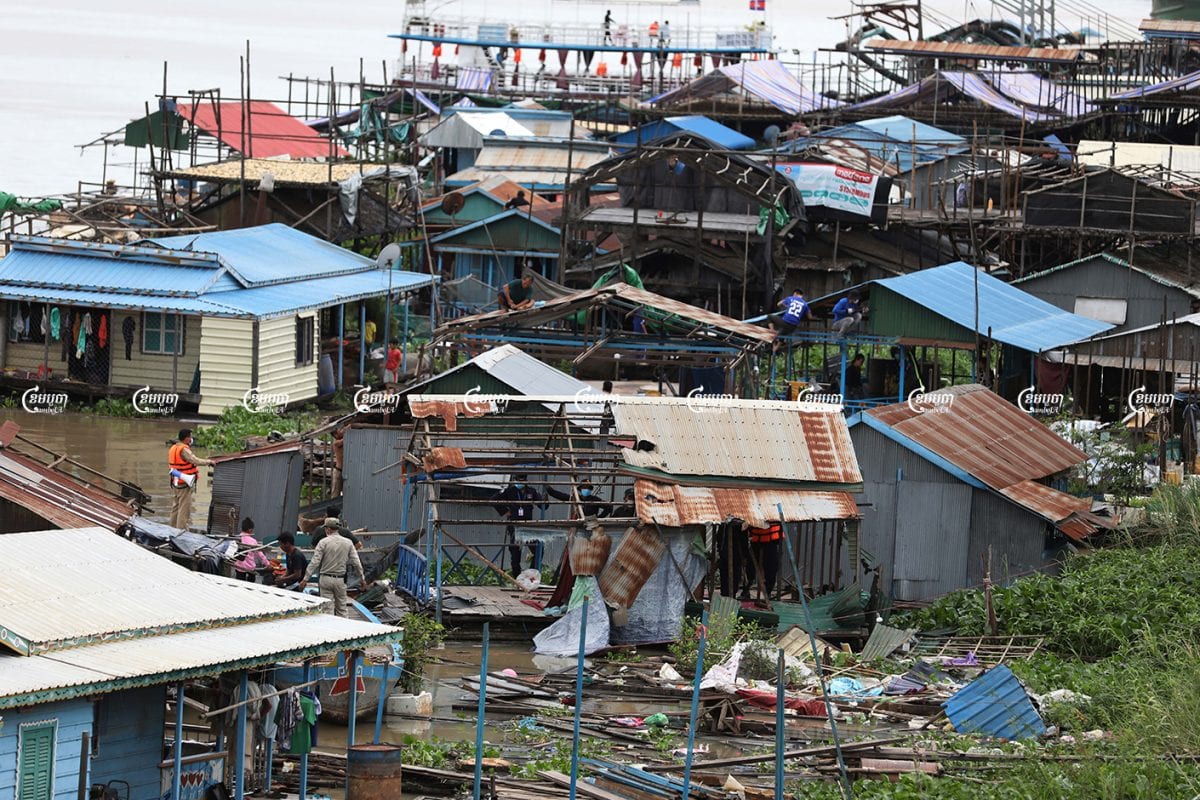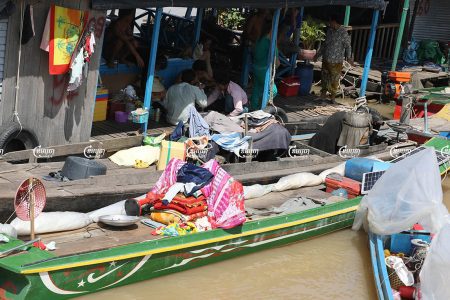Families living in floating communities along Phnom Penh’s rivers are being driven from their homes as local authorities began tearing down floating houses, fish farms and other informal settlements on Saturday. The demolition comes at the end of a one-week notice period ordering the largely ethnic Vietnamese fishing communities to leave due to what authorities described as environmental concerns.
Deputy Phnom Penh governor Keut Chhe said on Friday that the people living in floating houses had generally cooperated with the municipality’s decision to remove what it described as illegal residences on the river. He told CamboJA that households managing fish farms would be allowed to stay on the border between Prek Pnov district and Kandal province on the edge of Phnom Penh until their fish were old enough to be sold.
“We have temporary places for people who raise fish, so we are waiting for their request, and for statistics from local authorities on how many people are raising fish,” he said. He added that city authorities had begun compiling a list of households that farmed fish on Saturday. Other households, though, would not be given access to temporary residences.
“The people who just have floating houses but do not raise fish, they need to find a rental house by themselves,” Chhe said.
To Thy Va, 52, who has been living in a floating house in Phsar Lech village in Prek Pnov district’s Prek Pnov commune for 30 years, said that moving to the border of Kandal province was not an option for many families.
“More than 20 families and I decided not to live there because most of them owed money to the bank, so we cannot go,” she said. “We’ve found rental rooms near Phsar Lech village.”
Speaking to reporters on the riverbank next to her floating house, Thy Va said that many families didn’t know if they would be able to find a new home.
“I borrowed 6 million riel from the bank through a person who had land to guarantee her for 12 months — and I’ve only paid them for two months, so there are still 10 months remaining,” Thy Va said. “I need to pay the bank more than 600,000 riel per month.”
Thy Va was born near Longvek to the north of Phnom Penh. After first moving to Kampong Luong in Kandal’s Ponhea Leu district, her family came to the capital to live on the river. She said that like many of the people living in the floating community, she had a Permanent Resident Card giving her address as Phsar Lech village — and, she said, the express permission of the village chief and his predecessor to live there.
“[The authorities] ordered us to leave here on June 12,” she said. “If we don’t go, the authorities will use their forces to remove our floating houses.”

On June 2, municipal authorities released an announcement claiming that squatters in small floating houses and other informal structures on the river were polluting the water and affecting the ecosystem. In order to preserve the environment’s biodiversity, they added, all floating homeowners had one week to evacuate. The statement said that authorities would not be responsible for any damages, and would take legal action against people not complying with the measures.
For Thy Va, earning a living on the river had not been an easy task even before authorities ordered them to leave. She said that she could only sell the small fish she caught for 5,000 riel a kilogram.
“We live based on fishing and fish farming, and we receive between 500 kilograms to one tone per year,” she said.
To Yang Porn, 56, a representative of more than 20 families who live in Phsar Lech village, said that the eviction order had put many people in the community in a difficult situation.
“I think that most of them do not have the ability to find anywhere to live by themselves, but some families have some money to rent a room to live temporarily,” he said.
Yang Porn told CamboJA that the Vietnamese Embassy and the Vietnamese Association to Cambodia had sent a request to city hall, and to Prime Minister Hun Sen, to delay the eviction. So far, there has been no response.
“We asked the Phnom Penh authorities to delay removing them because they need time to raise their fish,” he said. “While their fish are this small, they cannot sell them yet.” Yang Porn said that there were between 30 to 40 fish farms in the village, with some families owning multiple feeding locations.
85-year-old Men San, a villager who lives near Prek Pnov bridge in Kandal village, said that he believed the people who lived in the floating houses were mostly Vietnamese nationals who had come to live on the river in the 1980s after the fall of the Pol Pot regime. He told CamboJA that there were now hundreds of families living on the river.
“I think that they were allowed to live there by the village and commune chiefs,” he said. “Because if they were not allowed by authorities, they would not have dared come to live there.”

The eviction order has not gone unnoticed across the border. The Vietnamese foreign ministry has called on the Cambodian government to ensure the welfare of people of Vietnamese origin, according to an article published in the daily English-language newspaper Vietnam News on June 11.
“Vietnam understands Cambodia’s socio-economic policies and the need to protect the environment,” ministry spokesperson Lê Thị Thu Hằng said. “But we also hope that the relocation will be conducted based on a reasonable and feasible roadmap, and new settlement areas will be arranged with all essential infrastructure, allowing for the relocated people to soon stabilize their lives and have their social welfare safeguarded.”
Prek Pnov district governor Sok Sambath and Chbar Ampov district governor Cheng Monira declined to comment on Saturday morning, saying that they were busy working to remove the floating houses. Sim Chy, director of Association of Khmer-Vietnamese in the Kingdom of Cambodia, could not be reached for comment on Saturday. The Vietnamese Embassy to Cambodia could also not be reached for comment.
Ny Sokha, head of monitoring at human rights group Adhoc, said that he supported the authorities’ actions, claiming that the measures were long overdue. He added that he believed that the floating communities’ presence on the river had had a negative impact both on Phnom Penh’s environment and its beauty.
“This is a suitable measure, but authorities need to think about human rights mechanisms too,” he said. “In order to be in line with our country’s implementation and respect for human rights principles, the authorities must address the relocation so that people can live as well.”
Sokha said that in his view, authorities should also be checking the immigration status of ethnic Vietnamese communities who had been living on the river.
“The authorities should review under the immigration law whether they have come to live in Cambodia legally or illegally,” he said. “The authorities must review all aspects of the law to avoid living with anarchy … if the review finds that they are living in Cambodia illegally, we must send them back to their countries.”









